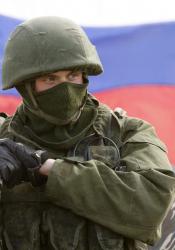2014 Russian Invasion of Crimea and Ukraine
History often repeats itself. The 2022 Russian Invasion has dominated the various outlets of media and multimedia in the digital world as well as in conversations in homes, cities, and nations. The topic of the Ruso-Ukrainian conflict is certainly known as is perhaps the most discussed topic of conversation since the onset of the COVID-19 health crisis. The 2014 Russian Invasion of Ukraine, however, is less known. The current invasion itself is actually a major event in the Russian-Ukrainian War that was initiated by the 2014 invasion. There are many commonalities between the two invasions. However, one commonality is difficult to ignore: Russian Nationalism. All forms of the Russian government are unified by the social concept of Russian nationalism amongst the Russian people, and Russian nationalism as a tool for empire and aggression.
As with the 2022 invasion, the 2014 Russian invasion of Ukraine began in the spring. An April 27, 2014 issue of The New York Times reported on the invasion of Ukraine. Neil MacFarquhar of the New York newspaper reported that the reasons that Vladimir Putin “has” to militarily and politically invade Ukraine are to “put a new, legitimate government in place; reclaiming an area that was historically part of Russia; gaining direct access to natural resources and factories that have been crucial to Moscow’s military-industrial complex since Soviet times. And his land grab of Crimea in March made him wildly popular at home” (MacFarquhar, Neil). The journalist then states the reasons that Vladimir Putin does not “have” for the invasion of Ukraine. He lists reasons such as the welfare of millions of people, the likelihood of significant Russian casualties, and pariah status internationally (MacFarquhar). He also states that “the negatives would seem to outweigh the positives” (MacFarquhar). However, the invasion still occurred in the spring of 2014 when militants and separatists advanced across the Ukrainian border into the Donetsk region of then-Ukrainian Crimea.
Nationalism is a major social concept within the Russian identity. “It is primarily instrumental” (Laruelle, Marlene). Nationalism is a tool that Russian governments have used to impose a sentiment of ethics and morality for Russian expansionism in Eastern Europe and often specifically in Ukraine and in Crimea. “Putin stirred historical memory and aspirations to great power status by claiming Crimea” (Laruelle, Marlene). Although the history of Russian nationalism and its inheritance to and from the Russian identity can be traced back to the ethnic Rus people of early medieval Eastern Europe, it can more readily be traced back to the Crimean War, the formation of the Soviet “Eastern Bloc”, and the various invasions in Soviet Russian history.
The military conflict ended after the conclusion of the Minsk II agreements in Belarus in 2015. However, the diplomatic tension between Russia and Ukraine as well as the political unease in Crimea remained in Eastern European politics until the Russian military invaded Ukrainian Crimea in the spring of 2022, eight years after the first Putin-era Russian invasion of Ukraine and specifically Crimea.
Works Cited
MacFraquhar, Neil. (page 17 N). (2014, Apr 27). New York Times (2008-) Retrieved from http://ulib.iupui.edu/cgi-bin/proxy.pl?url=http://search.proquest.com/ne...
Laruelle, Marlene. “Russian Nationalism and Ukraine.” Current History, vol. 113, no. 765, 2014, pp. 272–77, http://www.jstor.org/stable/45388560. Accessed 1 May 2022.
Kramer, David J. “THE UKRAINE INVASION: One Year Later.” World Affairs, vol. 177, no. 6, 2015, pp. 9–16, http://www.jstor.org/stable/43555264. Accessed 1 May 2022.

